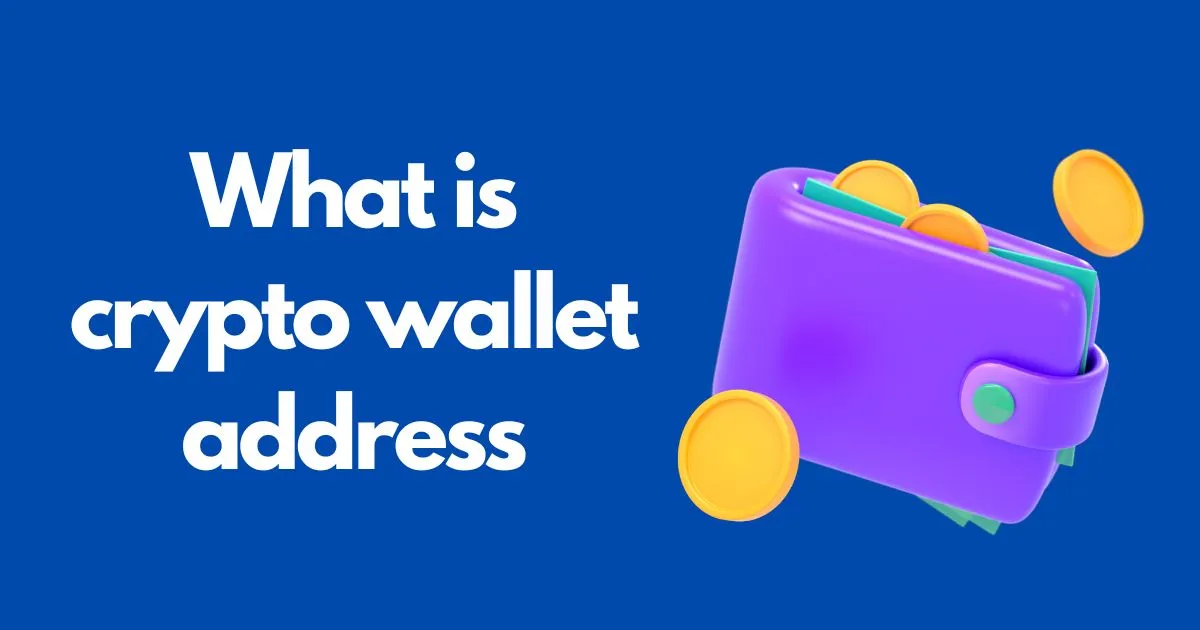In this article we will discuss about What is a Crypto Wallet Address? and How to use that. Cryptocurrency has gained immense popularity over the years, revolutionizing the financial industry and offering an alternative form of digital currency. As more people enter the world of cryptocurrencies, it becomes essential to understand the fundamental concepts associated with them. One such concept is a crypto wallet address, which serves as a unique identifier for users within the cryptocurrency ecosystem.
What is a Crypto Wallet Address?

Introduction
Cryptocurrencies rely on decentralized networks and cryptographic protocols to facilitate secure and transparent transactions. To engage in cryptocurrency transactions, users need a digital wallet to store their funds. A crypto wallet address is an alphanumeric string of characters associated with a specific wallet, acting as a destination for sending and receiving cryptocurrencies.
How Does a Crypto Wallet Address Work?
A crypto wallet address operates similarly to a traditional bank account number. It allows users to receive funds from others and initiate transactions by providing the sender with their wallet address. When someone sends cryptocurrency to a specific wallet address, the transaction is recorded on the blockchain, a distributed ledger that maintains the transaction history of a particular cryptocurrency.
Types of Crypto Wallet Addresses
There are different types of crypto wallet addresses, each offering varying levels of security and accessibility. Let’s explore the most common types:
Hardware Wallet Addresses
Hardware wallets are physical devices designed to store cryptocurrency securely. They generate and store private keys offline, making them less susceptible to hacking or online threats. Hardware wallet addresses are usually used in conjunction with software wallets to provide an additional layer of security.
Software Wallet Addresses
Software wallets are applications installed on computers or mobile devices that allow users to store, send, and receive cryptocurrencies. Software wallet addresses are typically generated and managed within the wallet application itself. They provide a convenient way for users to access their funds, but they are more susceptible to malware or hacking compared to hardware wallets.
Web Wallet Addresses
Web wallets are online services that store users’ cryptocurrency on remote servers. Web wallet addresses are generated and managed by the service provider. While web wallets offer easy accessibility, they can be vulnerable to security breaches, so it is crucial to choose reputable providers and implement additional security measures.
The Structure of a Crypto Wallet Address
A crypto wallet address consists of a combination of alphanumeric characters, typically in a Base58 or Base64 encoding format. The specific structure may vary depending on the cryptocurrency. For example, Bitcoin addresses start with a “1” or “3,” while Ethereum addresses begin with “0x.”
Public and Private Keys
Behind every crypto wallet address are a pair of cryptographic keys: the public key and the private key. The public key is derived from the private key and is used to generate the wallet address. It is shared with others to receive funds. The private key, on the other hand, should remain confidential and is used to sign transactions and access the funds stored in the wallet.
Generating a Crypto Wallet Address
When setting up a cryptocurrency wallet, a user typically generates a new wallet address. The wallet software or web service will generate a unique public-private key pair. The public key is then hashed and encoded to create the wallet address. This process ensures that each wallet address is unique and cannot be easily reverse-engineered to obtain the private key.
Security Measures for Crypto Wallet Addresses
Protecting your crypto wallet address is crucial to safeguard your funds. Here are some common security measures:
Two-Factor Authentication
Many wallet providers offer two-factor authentication (2FA) as an additional layer of security. 2FA requires users to provide a second form of verification, such as a unique code generated on a mobile device, along with their password to access their wallet or authorize transactions.
Multi-Signature Wallets
Multi-signature wallets require multiple signatures from different parties to authorize a transaction. This feature enhances security by reducing the risk of a single point of failure. For example, a wallet may require two out of three signatures from different key holders to complete a transaction.
Cold Storage
Cold storage refers to storing cryptocurrency offline, away from internet-connected devices. Cold storage options include hardware wallets or paper wallets. By keeping the private keys offline, they are protected from potential online threats, such as malware or hacking attempts.
Importance of Protecting Your Crypto Wallet Address
Protecting your crypto wallet address is crucial because it serves as the gateway to your funds. If someone gains access to your wallet address and private key, they can potentially steal your cryptocurrencies. It is essential to keep your private key secure and avoid sharing your wallet address with untrusted sources.
Using Crypto Wallet Addresses for Transactions
Crypto wallet addresses are used to send and receive cryptocurrencies. To receive funds, you simply provide the sender with your wallet address, and they can initiate the transaction. When sending funds, you need to enter the recipient’s wallet address to ensure the coins are transferred to the correct destination.
It is important to double-check the wallet address before initiating a transaction, as any errors can lead to irreversible loss of funds. Some wallets support QR codes, allowing users to scan the recipient’s address to minimize the risk of manual entry errors.
Common Mistakes to Avoid with Crypto Wallet Addresses
When dealing with crypto wallet addresses, there are some common mistakes to avoid:
- Entering the wrong address: Always double-check the wallet address before initiating a transaction to ensure you are sending funds to the intended recipient.
- Using an insecure wallet: Choose a reputable wallet provider that implements robust security measures to protect your funds and wallet address.
- Sharing your private key: Never share your private key with anyone, as it provides full access to your funds. Keep it secure and confidential.
- Falling for phishing attempts: Be cautious of phishing emails or websites that try to trick you into revealing your wallet address or private key.
- Neglecting regular backups: Regularly back up your wallet to protect against data loss. Losing access to your wallet address and private key can result in permanent loss of funds.
Differences Between Crypto Wallet Addresses and Traditional Bank Account Numbers
Crypto wallet addresses and traditional bank account numbers serve similar purposes in facilitating transactions, but there are some significant differences:
- Centralization vs. decentralization: Bank account numbers are associated with centralized financial institutions, while crypto wallet addresses are part of a decentralized network.
- Identity verification: Opening a bank account usually requires identity verification, whereas crypto wallets can be created anonymously.
- Transaction speed and fees: Cryptocurrency transactions can be faster and involve lower fees compared to traditional bank transfers, especially for international transactions.
- Cross-border accessibility: Crypto wallet addresses are accessible globally, allowing for seamless cross-border transactions without the need for traditional intermediaries.
- Ownership and control: With crypto wallet addresses, users have complete ownership and control over their funds and wallet address. They are not reliant on a centralized authority to manage or control their transactions.
The Future of Crypto Wallet Addresses
As cryptocurrencies continue to gain mainstream adoption, the functionality and security of crypto wallet addresses are expected to improve. Innovations such as decentralized identity solutions and enhanced encryption techniques aim to provide even greater security and ease of use for crypto wallet addresses. Additionally, advancements in user-friendly interfaces and integration with everyday payment systems may further simplify the process of using and managing crypto wallet addresses.
In conclusion, a crypto wallet address is a unique identifier within the cryptocurrency ecosystem that enables users to send and receive funds securely. It is generated from a public-private key pair, and various types of wallets exist to store and manage these addresses. Protecting your crypto wallet address and private key is of utmost importance to ensure the safety of your funds. By understanding the structure and functionality of crypto wallet addresses, users can confidently navigate the world of cryptocurrencies and harness their benefits.
FAQs
1. Can I use the same wallet address for different cryptocurrencies?
No, each cryptocurrency has its own unique addressing format. Therefore, you will need a different wallet address for each specific cryptocurrency you wish to store or transact.
2. What happens if I lose my crypto wallet address or private key?
Losing your wallet address or private key can result in permanent loss of access to your funds. It is essential to back up your wallet and store your private key securely. Without the private key, you may not be able to recover your funds.
3. Are crypto wallet addresses case-sensitive?
Yes, crypto wallet addresses are case-sensitive. It is crucial to enter the address exactly as it is provided to ensure the funds are sent to the correct destination.
4. Can I change my crypto wallet address?
In most cases, crypto wallet addresses are generated once and remain constant. However, some wallets allow you to generate new addresses within the same wallet for privacy purposes or to organize transactions.
5. Can I track transactions using a crypto wallet address?
Yes, blockchain explorers allow you to track transactions associated with a specific wallet address. By entering the wallet address, you can view its transaction history, including incoming and outgoing transactions.
Read More..
What is Crypto Mining and How Does It Work?
What is USDT Coin? Understanding the World’s Most Popular Stablecoin
What is NFT in Crypto?
In this article, we explored the concept of a crypto wallet address, how it works, its structure, and the importance of security measures. Understanding crypto wallet addresses is crucial for anyone venturing into the world of cryptocurrencies. By following best practices and staying informed, users can protect their funds and navigate the exciting opportunities offered by digital currencies.
